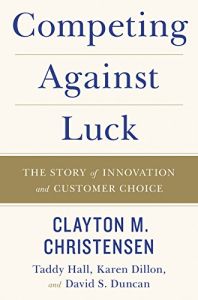Join getAbstract to access the summary!

Join getAbstract to access the summary!
Clayton M. Christensen, Karen Dillon, David S. Duncan and Taddy Hall
Competing Against Luck
The Story of Innovation and Customer Choice
HarperBusiness, 2016
What's inside?
Companies innovate successfully when they understand why customers “hire” products to do “jobs.”
Recommendation
The “Theory of Jobs to Be Done” unlocks the mystery of successful product innovation – a mystery often dismissed as luck. “Jobs Theory” holds that people don’t merely buy goods, they “hire” and “fire” products based on whether those products do the “job” that consumers need done. Companies practicing Jobs Theory know their understanding of consumer behavior helps predict successful innovation. Best-selling author and Harvard Business School professor Clayton M. Christensen and his co-authors Taddy Hall, Karen Dillon and David S. Duncan explain that the detailed observation of targeted customers – in their struggle to make progress – leads to a precise narrative that specifies the Job to Be Done. Such a narrative can serve all levels of an organization as a decision-making guide and a map of the need for an innovative product. getAbstract recommends this leap forward to professionals tackling product innovation and anxious to get it right.
Summary
About the Authors
Harvard Business School professor Clayton M. Christensen’s nine books include The Innovator’s Dilemma. He and co-author Karen Dillon, former Harvard Business Review, also co-wrote the bestseller How Will You Measure Your Life? Taddy Hall is a principal with the Cambridge Group. David S. Duncan is a senior partner at Innosight.


























Comment on this summary
Cannot agree more. An old-fashioned marketing concept.